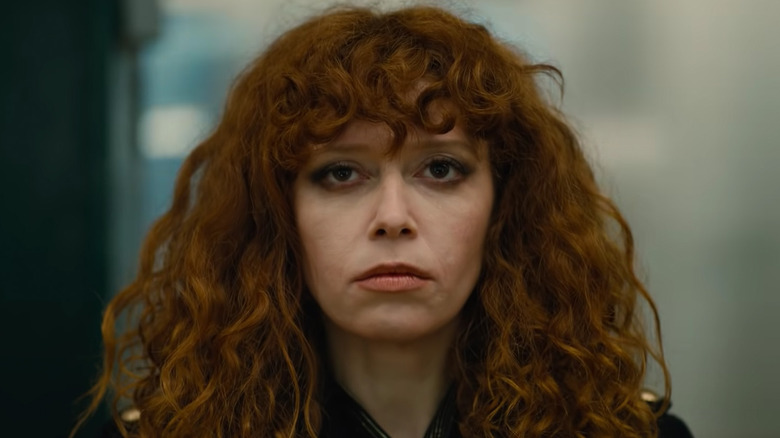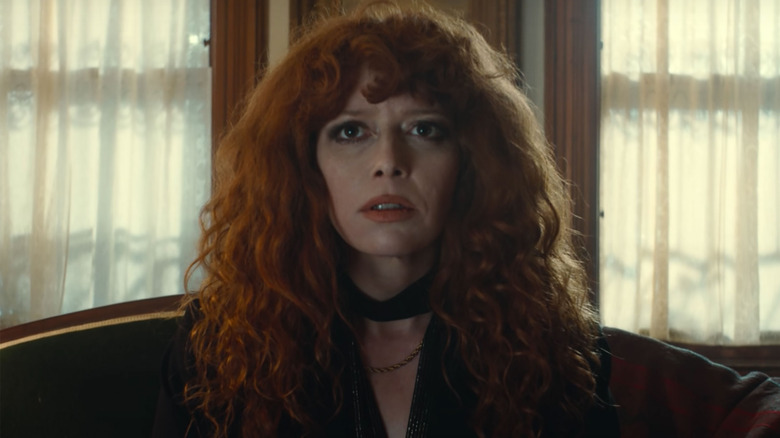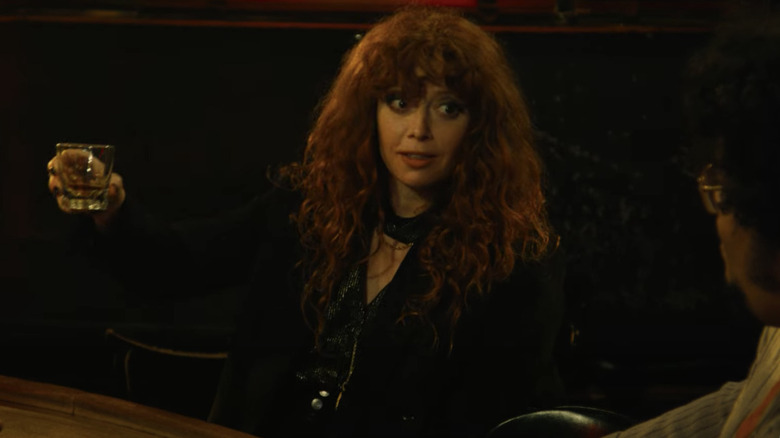Seeing Martin Sheen In Apocalypse Now Inspired Natasha Lyonne's Character Creation Process
Natasha Lyonne's leading roles are pretty unconventional female characters. They have a rugged androgyny that comes naturally to the actress, but it's not just Lyonne that gives them a sort of gender-transcendent quality. These characters break out of the traditional archetypes that most actresses are restricted by. In fact, they more closely resemble classic male characters — like Martin Sheen's Benjamin Willard in "Apocalypse Now."
Willard's descent into madness is memorable because it happens inwardly. We've seen women devolve into hysteria in cinematic masterpieces like "A Woman Under the Influence," but rarely do we take a female character's passivity to indicate introspection. Lyonne hoped to break out of this trope when she took the creative reigns on projects like "Russian Doll" and Rian Johnson's new series "Poker Face."
Even when women are protagonists, they are often "defined by an outer life," Lyonne pointed out in an interview with Time. The actress hoped to "circumnavigate" any "traditional, overused tropes," especially the idea that women could not have as rich an inner world as men:
"I remember, as a teenager, seeing Martin Sheen in 'Apocalypse Now' looking up at the ceiling fan while the Doors' The End was playing. It's so fascinating to watch a human being in process, ruminating, that we trust that to hold an audience's attention. So whenever I have a measure of say-so in a character's creation, I try to see to it that they're able to have their inner beat be the thing leading them around by the nose, rather than society's expectation of what a life should look like."
Lyonne's characters aren't just untraditional women — they are outcasts through and through.
Nadia is more like Philip Marlowe than Mabel Longhetti
Sheen was far from Lyonne's only influence as an actress, but she did gravitate more often toward male performers.
"[As] much as I love Bette Davis and Mae West and Gena Rowlands," she admitted, "I often found myself identifying with the Peter Falks and the Joe Pescis and the Jimmy Cagneys — all the boys. Certainly, by the time I was writing 'Russian Doll,' I saw a character who was the perfect mix of feminine and masculine."
For her character in "Poker Face," Lyonne and series creator Rian Johnson were both heavily inspired by Philip Marlowe, the gritty private eye of Raymond Chandler's novels most famously portrayed by Humphrey Bogart in "The Big Sleep" as well as Elliot Gould in "The Long Goodbye."
"It's such an iconic character type that we've seen permutations of it for, probably, seven decades now," Lyonne explained, so she and Johnson thought it was about time that a woman embodied this legendary role. The actress also found another way of avoiding trivial characters — hiring female writers.
"The best part is not having conversations eat up a lot of time about how a woman can have a classic hero's journey," Lyonne confessed to The Wrap. Or you know, 'Why is she wearing black clothes' or 'Why aren't we seeing her shower?' That's disturbing. You would never ask that of, like, Elliott Gould's portrayal of Philip Marlowe." Both seasons of "Russian Doll," which Lyonne also co-created and produced, had a writing staff made up entirely of women. The actress insists that this choice wasn't intentional, but rather a "happy accident."
"I'm always trying to assemble the Avengers obviously, you know, (creators) Leslye Headland, Amy Poehler, Allison Silverman, true blue-chip geniuses," Lyonne admitted. "And they're f***ing hilarious."
Lyonne's old tutor showed her the film as a child actor
Lyonne knows that good characters speak to the human experience, not just a woman's. The other side of that coin is that women are capable of communicating universal human experiences just as well as men. Anyone who has spiraled into despair while staring at a ceiling fan can feel intimately familiar with Willard in "Apocalypse Now," just as they can with Nadia in "Russian Doll."
This is not to say that other women in show business don't serve as inspiration for Lyonne. As a matter of fact, it was a woman who put her on to "Apocalypse Now" in the first place.
"As a kid actor, I also had an on-set tutor named Karin Cooper," the actress told W. "She taught me about 'Apocalypse Now' and the book 'Heart of Darkness,' and also the Surrealist movement, André Breton. That combo platter really shifted the way I began to see things."
Not every female character needs to be as androgynous as Lyonne's for there to be a realistic and balanced depiction of women in cinema. But it would be nice if more actresses were given the creative freedom to really explore the inner lives of their characters without relying on the world around them to make them interesting, wouldn't it?


